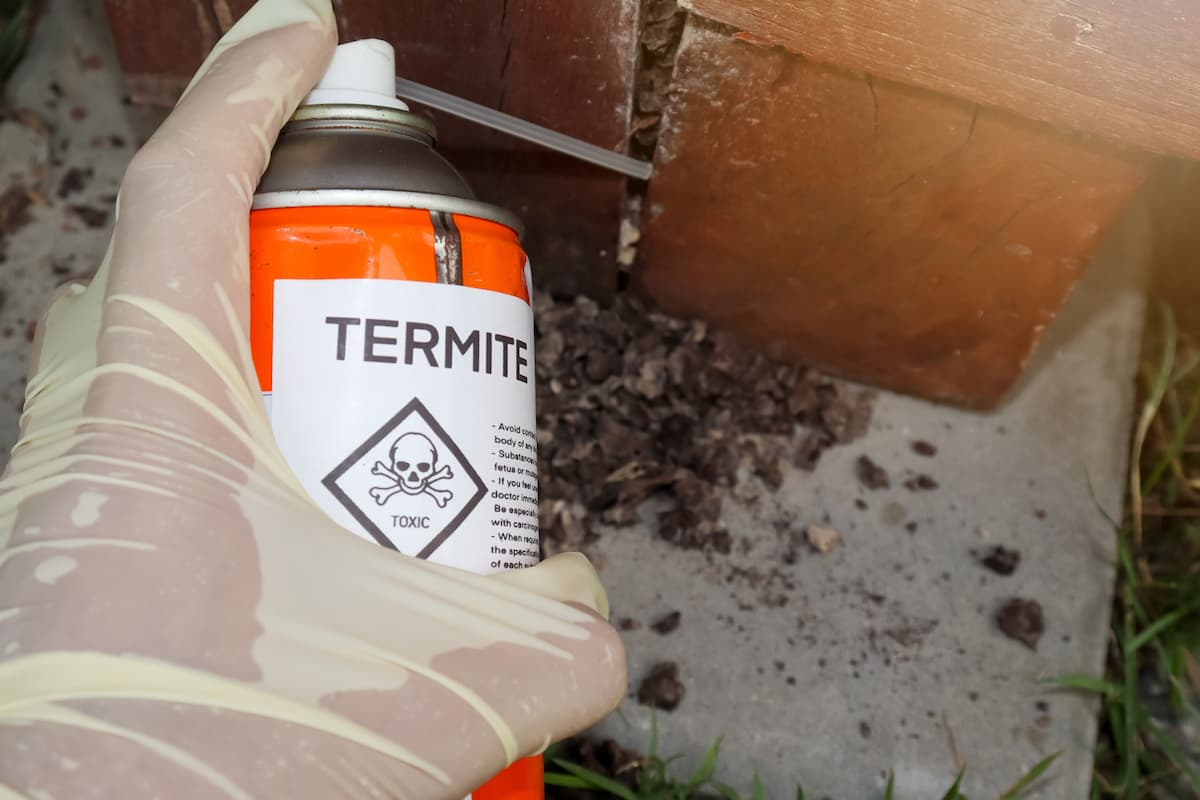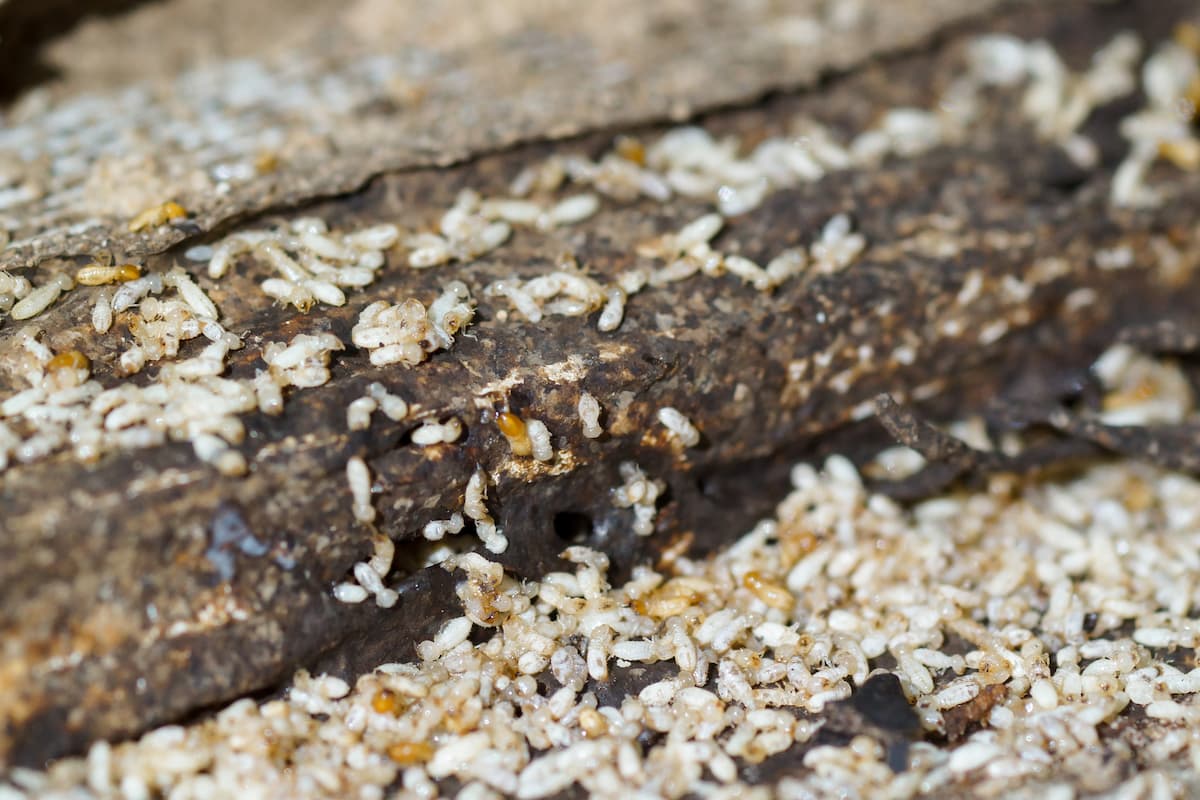Can You Kill Termites With Bug Spray?
One big mistake people make when dealing with termites is trying to spray them and expecting them to just disappear.
It usually takes more than just a spray to get rid of termites, but bug spray can be effective.
Bug sprays, like those used for flies, kill termites if sprayed directly on the insect. The problem is that sprays won’t harm termites if they come into contact with it on surfaces. Termite-specific sprays and home remedies are the best options for termite-killing sprays.
Spraying For Termites

Normal bug spray contains insecticides that can kill termites. Unfortunately, it isn’t effective at eliminating colonies or killing termites over time, as only termites sprayed directly with fly or bug spray will be affected.
Most termite-specific sprays work slowly, attacking the insect’s nervous system and killing them over weeks.
The strongest chemical sprays should only be used outdoors because they pose a serious risk of poisoning for humans and pets.
Termite foam is a sprayable foam that expands when applied. It’s the best option for getting poison into hard-to-reach spots or cracks.
Generally, these are odorless and safe to use in the home.
Can Raid Kill Termites?
You should not spray flying termites with Raid or any other chemical sprays. Instead of killing them quickly, it makes them swarm harder.
That said, Raid ant spray can be an effective way to kill termites. It works faster than borax-based sprays because it can penetrate their exoskeletons, and you don’t have to wait for the termites to ingest it.
The pesticides in Raid ant spray work by dehydrating the termites or shutting down their metabolism, leading to death.
Natural Termite Sprays
If you want to use a spray to kill termites, both on contact and over time, the best option is to mix your own.
Vinegar is a great option for killing termites. Use a half cup of vinegar and mix it with the juice of two lemons.
While it may have a strong smell, the acidic mixture dissolves termite exoskeletons on contact. The spray can also linger on surfaces and kill termites that come into contact with it later.
Orange oil is another top choice for at-home termite spray. You can spray it as is, and the oil will also dissolve the termite’s exoskeletons.
These options are safe around people, kids, pets, and plants. They don’t use harsh chemicals and don’t have a strong chemical odor.
Spraying regularly outside the home, in your garden, or along the baseboards can help kill and prevent termite infestations.
It takes regular, repeated treatments for either of these natural sprays to be effective. Thankfully, a quick spray each day is usually enough.
However, the best options for killing termites don’t always involve using bug sprays. Calling a pest professional or exterminator is your best option if nothing else is working.
For large infestations, they may recommend spraying or tenting your home. In this case, you’ll need to leave for a few days to let the poisons settle.
Termite Maintenance Plans
Eliminating and preventing termite infestations is an ongoing process that usually requires an effective plan.
Homes with a history of termites are prone to getting termites again, and the risk of termites increases in warmer climates and regions.
The best termite control plans are multi-faceted. Generally, one prevention method or way of killing termites isn’t enough.
Combining methods is always the best bet.
Termite sprays can help get rid of termites. Liquid treatments are primarily used outdoors.
These treatments involve a boric-acid mixture that gets sprayed into the ground to form a barrier. Any termites that come into contact with the chemicals die, keeping them from reaching your home.
Any gaps in the barrier or it washing away can decrease its effectiveness.
Bait stations are another important part of a maintenance plan. They also tend to use borax, but it is mixed into a food source that attracts the termites.
It works slowly, giving the termites time to return the food to their colony and spread the poison.
Generally, you place bait stations around your home or garden in ten to twenty-foot intervals. The bait stations can even be placed outside of termite nests.
They then form a barrier in a sense. The termites will run into the bait station and take the poison home before getting to what you’re trying to protect.
Regularly spraying natural termite sprays will also help get rid of termites.
Pest experts will be able to help you place bait stations, put down liquid treatments, and make a comprehensive plan for preventing further infestations.
Do Termites Come Back After Treatment?

Liquid termite treatments are usually effective for around five years. On average, bait stations last a year and need to be monitored and maintained.
How long treatments last can vary quite a bit. Rainfall is one big factor in the effectiveness of liquid treatments, as areas that receive significant rain tend to have their treatments washed away faster.
Once the defenses are down, termites can come back. Whether the remnants of an old infestation get started back up, or new termites move in, they can return in force.
Homes with a history of termite infestations are at a higher risk than homes that have never had termites.
There is no permanent solution to a termite infestation. A colony may be eliminated, but it doesn’t keep another from taking its place.
Long-term maintenance plans are the only way to continually deter termites and attempt to prevent infestations.
Conclusion
Bug spray can kill termites, but it isn’t an effective way to kill off a colony or eliminate an infestation. Termite-specific and natural sprays are much more effective at killing termites both on contact and over time.
A full termite maintenance plan is the key to eliminating infestations and preventing them in the future.
